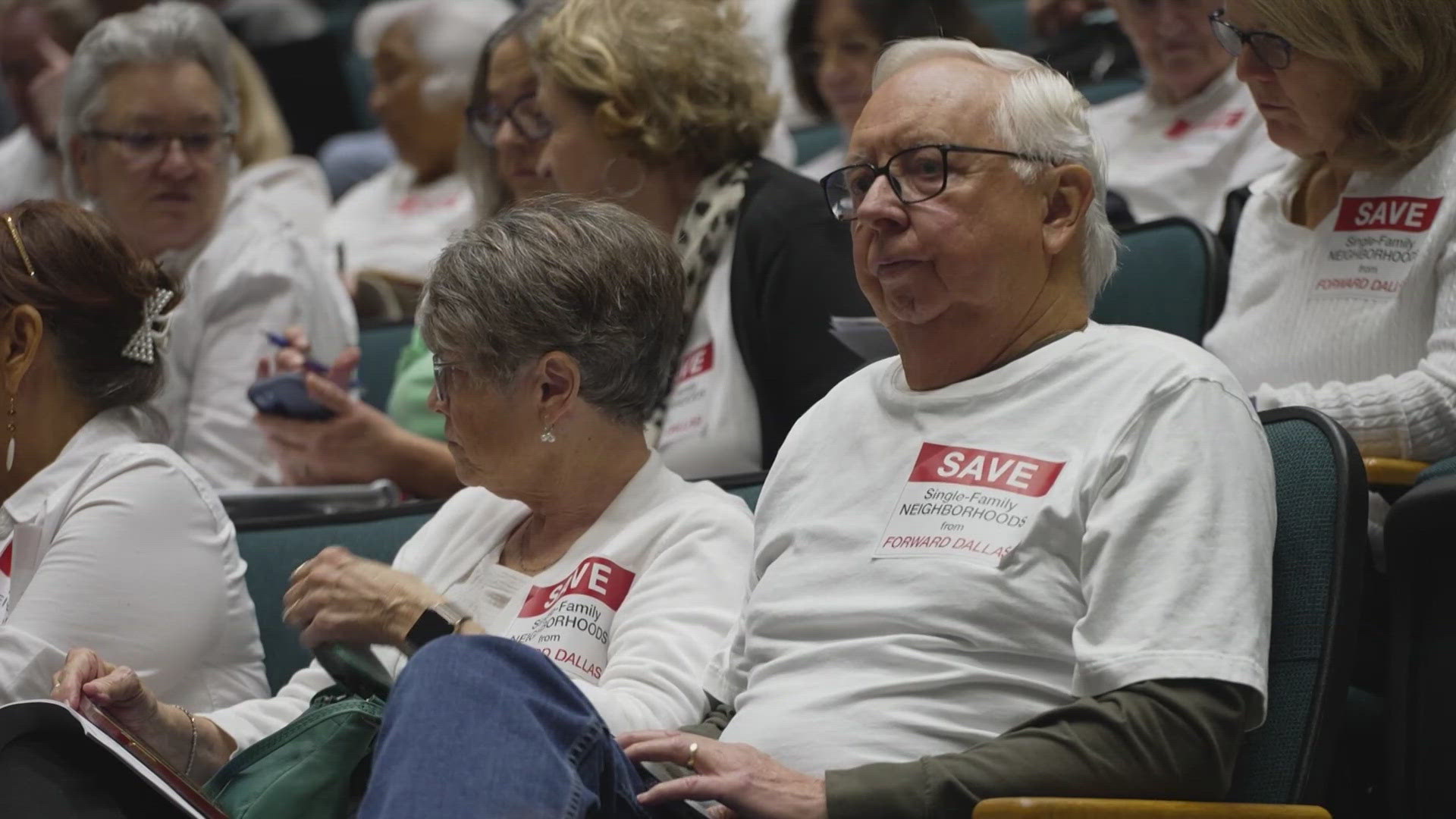DALLAS — After hours of contentious debate, the Dallas City Council voted to approve an amended version of the controversial Forward Dallas land use plan Wednesday evening.
The vote was 11-4 — and came after nearly a hundred concerned comments from opponents and supporters alike.
The document is an update of a 2006 guide which informs what sorts of buildings can go where in the city. It includes provisions preventing polluters in neighborhoods and encouraging development near DART stations, but what it may mean for housing has dominated the debate.
Controversially, the updated plan allows possible future zoning changes to permit increased density in single-family neighborhoods. However, the city says any future zoning changes will be pursued on an individual basis and are subject to the existing zoning process, which includes opportunities for public input.
In a statement lauding its passing, Councilmember Chad West said "The final version of Forward Dallas 2.0 is exactly what it should be -- a compromise where everyone feels a bit dissatisfied but can live with the results, knowing they move the city forward."
Proponents argued the updates to the plan are critical as Dallas faces a housing affordability crisis that city leaders fear will cause people to move out of the city.
"I think housing is you know our biggest issue as a city and so I think it’s the one that we need to focus on the most," said Adam Lamont, the co-founder of Dallas Neighbors for Housing. "I do think [single-family] neighborhoods can have more housing done respectfully and done in an appropriate way that fits the neighborhood and makes the neighborhoods better."
The city is also facing a tight budget and allowing for additional housing will mean more property tax revenue for the city, which is certainly a side benefit -- if not an intended outcome of the new Forward Dallas plan.
Detractors, mainly from single-family areas, fear the plan will make it more difficult to fight zoning changes down the line -- which could mean duplexes and small apartment complexes on lots that used to have just one home.
"I don't want that," said Gary Moore, a resident opposed to the plan.
"There’s plenty of areas in Dallas where they can build townhomes and duplexes that are not within a single family neighborhood," added his wife Marilyn Moore.
More neighbors could lead to more traffic and affect property taxes, which outweighs, they say, any possible affordability increase.
The debate Wednesday grew contentious at times, with Councilmember West successfully moving to stifle debate on an amendment from Councilmember Paul Ridley that he argued would disrupt the years-long public process.
At one point, Councilmember Cara Mendelsohn told the audience "I’m not going to say to the residents thank you for being here, I’m going to apologize for putting you through this process."
Amid the controversy, council members approved amendments from an earlier meeting, including a new objective to "protect and preserve existing neighborhoods."
Single-family neighborhoods fall under the "community residential" place type in the new Forward Dallas plan. City planners describe it as "single-family homes with some schools, parks, religious centers. Streets tend to be long, curvy, some cul-de-sacs."
Under the approved Forward Dallas, this place type will allow single-family homes, townhomes and duplexes as a "primary use," which is defined as "a more prevalent and prominent land use that plays a pivotal role in characterizing a place type."
An amendment also eliminated triplexes as a primary use in this place type.
Housing complexes with up to eight units will be allowed as a secondary use, plans for which city zoners will require justification and for which there will be additional scrutiny.
"Changes to areas within Community Residential neighborhoods should look to add housing in a way that is gentle, equitable, incremental, and sensitive to the existing context, while doing so in a manner that strengthens these neighborhoods and incorporates inclusive community engagement efforts," the Forward Dallas plan reads.
Another amendment will add that "incompatible multiplex, townhome, duplex, triplex, and apartment development should be located outside of existing single-family neighborhoods."
Another amendment says multiplexes should be prioritized along main arterials, not neighborhood streets, and another encourages visual buffers between single-family uses and other "more intense" adjoining uses.

